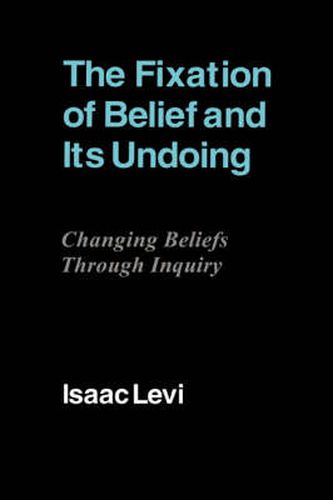Readings Newsletter
Become a Readings Member to make your shopping experience even easier.
Sign in or sign up for free!
You’re not far away from qualifying for FREE standard shipping within Australia
You’ve qualified for FREE standard shipping within Australia
The cart is loading…






Isaac Levi’s new book is concerned with how one can justify changing one’s beliefs. The discussion is deeply informed by the belief-doubt model advocated by C. S. Peirce and John Dewey, of which the book provides a substantial analysis. Professor Levi then addresses the conceptual framework of potential changes available to an inquirer. A structural approach to propositional attitudes is proposed which rejects the conventional view that a propositional attitude involves a relation between an agent and either a linguistic entity or some other intentional object such as a proposition or set of possible worlds. The last two chapters offer an account of change in states of full belief understood as changes in commitments rather than changes in performance; one chapter deals with adding new information to a belief state, the other with giving up information. The book builds upon topics discussed in some of Levi’s earlier work. It will be of particular interest to discussion theorists, epistemologists, philosophers of science, computer scientists, and cognitive psychologists.
$9.00 standard shipping within Australia
FREE standard shipping within Australia for orders over $100.00
Express & International shipping calculated at checkout
Stock availability can be subject to change without notice. We recommend calling the shop or contacting our online team to check availability of low stock items. Please see our Shopping Online page for more details.
Isaac Levi’s new book is concerned with how one can justify changing one’s beliefs. The discussion is deeply informed by the belief-doubt model advocated by C. S. Peirce and John Dewey, of which the book provides a substantial analysis. Professor Levi then addresses the conceptual framework of potential changes available to an inquirer. A structural approach to propositional attitudes is proposed which rejects the conventional view that a propositional attitude involves a relation between an agent and either a linguistic entity or some other intentional object such as a proposition or set of possible worlds. The last two chapters offer an account of change in states of full belief understood as changes in commitments rather than changes in performance; one chapter deals with adding new information to a belief state, the other with giving up information. The book builds upon topics discussed in some of Levi’s earlier work. It will be of particular interest to discussion theorists, epistemologists, philosophers of science, computer scientists, and cognitive psychologists.